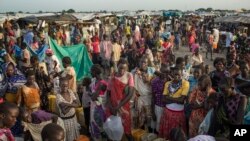South Sudan is facing a massive humanitarian and displacement crisis, with thousands of refugees fleeing to neighboring countries and many more becoming internally displaced.
The U.N. refugee agency said Tuesday that the number of South Sudanese refugees fleeing to Uganda over the past 10 days had doubled, to more than 52,000, since fighting between government and rebel forces erupted three weeks ago in Juba, the capital.
Another 1,000 have fled to Kenya, and 7,000 have gone to Sudan, the agency said.
The escalating violence has put the fragile cease-fire agreement hatched last August between South Sudanese President Salva Kiir and opposition leader Riek Machar on life support, along with the recently formed unity government.
The latest surge of 60,000 refugees pushed the overall number of South Sudanese refugees to nearly 900,000 since civil war broke out in December 2013.
Those arriving in Uganda have reported that a variety of armed groups — some allied with the government, others with rebel forces and still others seeking to profit from the chaotic situation — have been preventing people from leaving South Sudan.
Melissa Fleming, the UNHCR spokeswoman, said, “Some people are finding that they cannot leave because they do not have the money to pay people off. But definitely it is very difficult to leave without some cash in order to pay whoever is asking for it at the checkpoint.
“Refugees have also reported that armed groups operating across different parts of South Sudan are looting villages, murdering civilians and forcibly recruiting young men and boys into their ranks.”
Fleming noted that more than 85 percent of the refugees arriving in Uganda are women and children under 18. She told VOA that many refugee children are suffering from severe malnutrition in both Uganda and Kenya.
”We are very concerned about quickly having the capacity to treat the increasing numbers of malnourished children who are coming across, and some severely malnourished who need immediate nutritional assistance,” Fleming said.
4.8 million hungry
The displacement and health situation inside South Sudan is even worse. The United Nations reports more than 1.6 million people are internally displaced and an estimated 4.8 million people are short of food.
According to the World Health Organization, severe food shortages have created a nutritional crisis. “We estimate that some 600,000 children in South Sudan under 5 are acutely malnourished,” said spokeswoman Fadela Chaib.
“WHO has sent a newly designed kit containing supplies for the medical management of severe acute malnutrition in children, and further supplies are on their way," Chaib said. "This kit is really designed to provide help to malnourished children. It has appropriate food, but also medicines and equipment to take care of children who are suffering precisely from malnutrition.”
At the end of June, South Sudan declared an outbreak of cholera in Juba county. This fast-moving disease, which also has been reported in camps for internally displaced people, already has killed 21 people among the 586 cases detected.
Chaib told VOA the high fatality rate was “probably a result of lack of access to health care."
"Currently, only Juba teaching hospital has been designated as a cholera treatment center," the WHO official said. "At least 100 additional beds are needed."
Cholera is an acute intestinal infection caused by contaminated food or water. It can kill within hours if not promptly treated. To combat the outbreak, WHO, the South Sudanese Ministry of Health and its partners are conducting an oral cholera vaccination campaign, targeting more than 14,000 people in its initial phase.
But given the conflict and the limited access to health care, safe water and sanitation, the World Health Organization has warned that the risk of the further spread of cholera and other diseases remains a major concern.
With the coming rains, WHO expects an increase in malaria and water-borne diseases. The U.N. health agency is particularly concerned about malaria, which is the No. 1 morbidity factor in the country. Since June, South Sudan has reported 3,316 cases of malaria in Wau, Western Bahr el Ghazal state.
An explosion of measles, a major killer of young children, has infected 1,564 children as of mid-July, including at least 17 who have died. WHO’s Chaib said “most of the measles cases have been reported in camps for internally displaced people, where families live in overcrowded conditions and many children are malnourished.”
With support from UNICEF and other partners, WHO has vaccinated more than 13,000 children, and plans a countrywide follow-up measles campaign for November.






